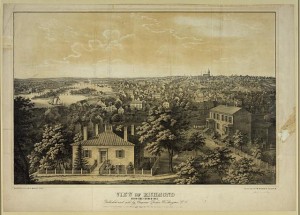The bulk of the following article details the legal wrangling in the Richmond trial of William Henry Hurlbert. The judge’s decision is reproduced here.
From The New-York Times July 27, 1861:
THE CASE OF MR. W.H. HURLBURT
WM. H. HURLBURT, arrested at Atlanta, Georgia and sent on to Richmond, as a spy, was, on Thursday the 4th, as we learn from the Charleston Courier brought before Judge JNO. A. MEREDITH, and the examination of his case, on a writ of habeas corpus resumed. …
From the decision, given on the subsequent day, we make the annexed extract:
“In this case it has been clearly proved that the prisoner was a resident of the State of New-York for several years; and it is further proved that prior to the 6th of June last he left the State of New-York, and on that day entered the State of Virginia, by a permit from Gen. JOHNSTON. He remained a few days in the State, and went on to the State of South Carolina, where, after spending a short time, he proceeded on to Georgia, in which State he was arrested and brought back to this city, and on the 24th of June committed, by order of the Executive. This is all the proof in the case,bearing on this point. It will be seen that it does not prove that he left the City of New-York with the intention of abandoning his residence there; still less does it prove an intention of returning to his native domicil. In fact, the testimony of the case tends strongly to show that his sojourn was temporary; for, during the twelve days he was in the South, he passed through four States; and, whilst in South Carolina, did no act which looked to a permanent residence in that State. He passed through it as rapidly as he did through the other States.
The prisoner, in his petition, under oath, avers that he is without citizenship, unless his nativity in South Carolina confers it. He does not aver an intention to return to the domicil of his nativity.
Upon an examination of the whole case, I am led to the conclusion that the prisoner is a citizen of the State of New-York, a State foreign to the Southern Confederacy and at war with it; and, therefore, the executive had jurisdiction of the case, and his judgment cannot be rescinded.
The prisoner is remanded to the custody of the Sergeant.
William Henry Hurlbert wrote editorials for Henry J. Raymond at The New-York Times from 1857 until 1860 (from the Wikipedia article):
Political differences that came to a head during the 1860 presidential campaign forced Raymond and Hurlbert to part ways. Raymond remained a moderate Republican who supported Lincoln. Hurlbert, who feared that the election of a Republican president would create dangerous repercussions in the South, favored Stephen A. Douglas, Lincoln’s Democratic rival. Hurlbert watched helplessly as the Union unraveled following Lincoln’s victory. An abortive personal peacemaking expedition led to his incarceration in Richmond, Virginia, the Confederate capital, from July 1861 until August 1862.
After he was released from prison Hurlbert wrote for the Democrat newspaper, The New York World.
Recently Hurlbert has been credited with writing the anonymously published The Diary of a Public Man. You can read a take on The Diary at Civil War Bookshelf.

